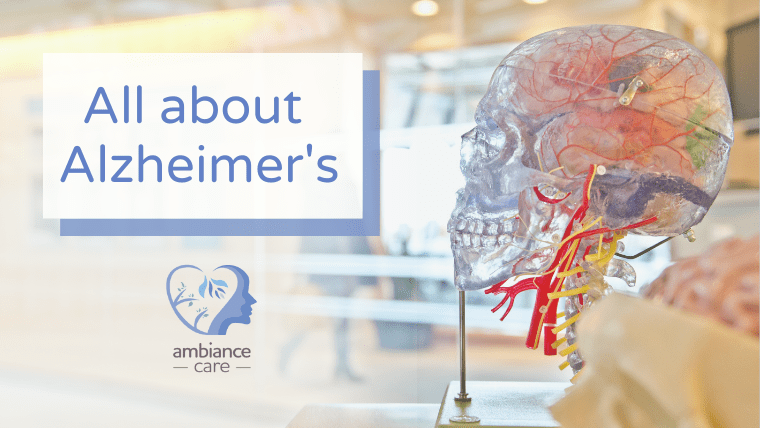All about Alzheimer’s
To coincide with Alzheimer’s Awareness Month, our September blog post is all about Alzheimer’s disease.
What is Alzheimer’s? Is Alzheimer’s the same as dementia? How does Alzheimer’s disease affect someone?
These are some of the most common questions we’re asked at Ambiance Care when a family member receives a diagnosis, and we answer them all – and more – below.
We’d encourage everyone regardless of a diagnosis to familiarise themselves with these fundamental points, because Alzheimer’s – and dementia in general – is becoming more and more common. Raising awareness has never been more important.
What is Alzheimer’s?
Named after Alois Alzheimer, the German doctor who identified the first published case of the disease, Alzheimer’s is a brain disorder that affects thinking, memory and mental abilities.
In the brain, nerve cells are connected – this is how we’re able to think and perform daily tasks. Alzheimer’s disease causes proteins to build up between cells and break these connections, which eventually results in cells dying off and the brain shrinking. Alzheimer’s is progressive, which means symptoms tend to get worse over time.
Is Alzheimer’s the same as dementia?
Dementia is an umbrella term for disorders and diseases that cause an ongoing decline in brain functioning. Alzheimer’s is one form of dementia – the most common – but there are more than 200 others.
Along with Alzheimer’s, other conditions that fall under the umbrella include vascular dementia, Huntington’s, frontotemporal and Lewy body dementia.
How common is Alzheimer’s?
Here in the UK, NHS estimates suggest that one in 14 people over the age of 65 has Alzheimer’s, increasing to one in six among the over-80s. Alzheimer’s doesn’t just affect the elderly, though: one in every 20 people with Alzheimer’s is under 65.
More than 520,000 people in the UK have Alzheimer’s disease and the number is expected to rise. Worldwide, more than 55 million people live with dementia, and Alzheimer’s is thought to account for between 60 and 70% of cases.
How does Alzheimer’s affect an individual?
Someone with Alzheimer’s disease will experience memory loss and thinking difficulties. At first, these symptoms may present like forgetfulness in old age, but Alzheimer’s isn’t a normal part of aging.
Over time, an individual may become confused and experience difficulties with speaking and understanding. Their behaviour and social skills may change as a result, and they may struggle to function independently.
What’s the prognosis for Alzheimer’s?
Although Alzheimer’s is a life-limiting disease and progressive in nature, it can affect people differently and at different rates. Some individuals with Alzheimer’s can continue to live independently with support for a number of years after a diagnosis, while others will need full support sooner.
At Ambiance Care, we’re firm believers in life after a dementia diagnosis. Our team supports people living with Alzheimer’s to enjoy what they love for longer, and experience life to the full despite their diagnosis, until the time comes that they need constant care. We make every moment count.
For more information following a diagnosis of Alzheimer’s, Ambiance Advice can answer all of your questions – call us today on 0161 537 0983 or email us at enquiries@ambiancecare.co.uk and we’ll get straight back to you.


